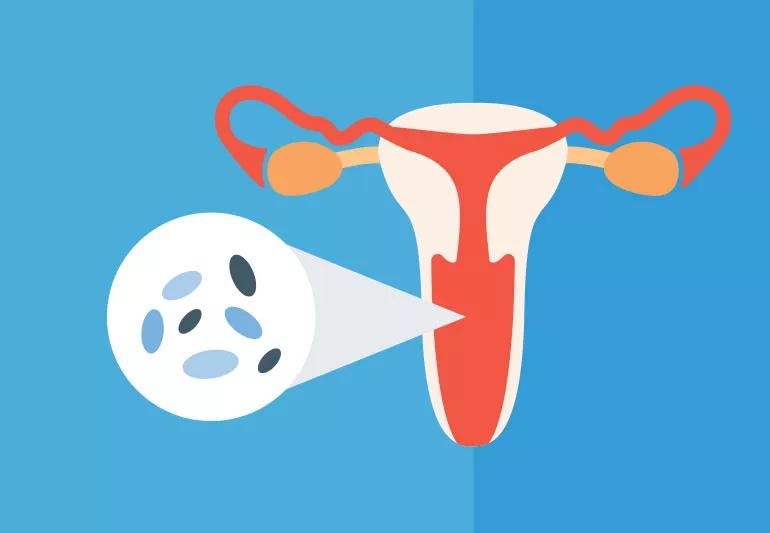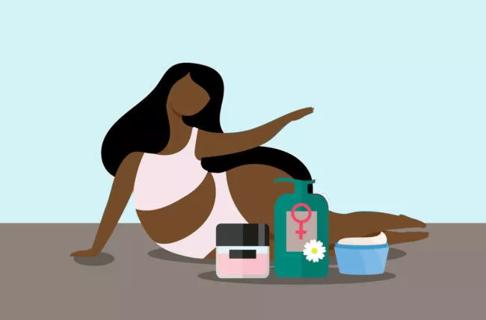How to identify and treat vaginal conditions

When you feel the itch, irritation and pain of vaginal-area discomfort, your first thought is likely of a yeast infection. But other common disorders can cause similar discomfort.
Advertisement
Cleveland Clinic is a non-profit academic medical center. Advertising on our site helps support our mission. We do not endorse non-Cleveland Clinic products or services. Policy
Ob/Gyn Oluwatosin Goje, MD, says some vulvar disorders are contagious and others are not. Either way, knowing the signs will help guide you in treating them. And if your problem is contagious, knowing this can help you avoid passing it along.
Here’s a rundown on five of the most common vulvar conditions:
Identifying it: The Candida albicans fungus causes an infection in roughly 75% of women at some point. Also known as a yeast infection, it causes vulvar swelling and redness, severe vaginal itching, burning, painful urination and painful sex. A white, thick, clumpy, odorless vaginal discharge accompanies the infection. But some patients don’t have a discharge and the majority of symptoms are on the vulva.
Yeast infections are generally not contagious. However, in rare cases, they can be passed along in both heterosexual partners and same-sex partners. About 15% of male partners can be infected with yeast infections on their penis.
Treating it: “Various over-the-counter creams or an oral prescription medication can effectively clear up a yeast infection,” Dr. Goje says. If symptoms persist, reach out to your health care provider
Identifying it: Allergens and other irritants such as laundry detergents, fabric softeners, body soaps, feminine health products and deodorized tampons can cause mild-to-severe vulvar itching, reddens, skin thickening and a raw feeling. Infections don’t usually occur, but you could feel dampness due to vulvar irritation and skin “weeping.”
Advertisement
You may also feel pain during sex and urination or during a vaginal exam. A physical exam and biopsy of vulvar wall cells can diagnose contact dermatitis.
Treating it: Take a short (10 or 15 minutes), lukewarm bath with or without four or five tablespoons of baking soda two or three times daily to help relieve itching and burning. For more severe cases, your doctor may prescribe steroid treatment to reduce redness, swelling and itching.
To figure out what’s behind the problem, remove possible irritants one by one to see which one causes the reaction.
Identifying it: Genital herpes is a very common type of sexually transmitted disease caused by the herpes simplex virus (HSV). The most common symptoms of herpes are painful ulcers (also called lesions) that appear on the vulva and within the vagina and cervix. But it is possible to have HSV and have no symptoms. These small itchy ulcers, resembling small pimples or blisters, can spread to thighs and buttocks, crust over and scab. They take from two to four weeks to heal and, during initial outbreaks, flu-like symptoms appear.
Treating it: “Antiviral medications help to shorten the duration and intensity of outbreaks. They combat and/or reduce frequency of outbreaks of this sexually-transmitted disease, but there’s no cure,” Dr. Goje says. Consistent use of condoms have also been shown to reduce the risk of transmission to a non-infected partner.
Identifying it: This uncommon skin condition occurs most often in post-menopausal women and causes shiny, smooth spots on the vulva. The patches can grow and skin can tear easily, leading to bright red or purple bruises. Sometimes scars develop, narrowing the vaginal opening and making sex painful or impossible.
Symptoms include itching, discomfort/pain, bleeding, and blisters, Dr. Goje says. The cause is unknown, but some doctors think overactive immune systems or hormonal problems are to blame. Lichen sclerosus is not contagious.
Doctors usually diagnose lichen sclerosus with a visual exam, but your doctor might biopsy a small piece of vulvar skin to rule out any other conditions.
Treating it: Very strong cortisone creams or skin ointments applied to existing patches daily for several weeks can alleviate itching. Continued treatment twice weekly can prevent patches from returning. Follow up regularly with your doctor because ointments can cause skin thinning, redness or yeast infections.
Identifying it: This common sexually transmitted infection is caused by a parasite called Trichomonas vaginalis. It is the most common curable sexually transmitted disease and can occur in anyone who engages in unprotected sex. It’s accompanied by vulvar swelling, redness, and itching, painful and frequent urination, and pain during sex. Vaginal discharge (foamy, white, gray, yellow or green with a foul odor) is also common. Cell cultures and physical exams can diagnose the infection.
Advertisement
Treating it: A single dose of antibiotics treats the infection for both you and your sexual partners. You and your partner should be treated to prevent reinfection
There are steps you can take to limit or avoid vulvar infections and disorders, Dr. Goje says.
“If you do contract one of these conditions, try not to scratch because it leads to further skin irritation and discomfort, and can further spread the infection,” Dr. Goje says.
“It’s always important to have your physician examine you if you have symptoms and can’t get relief,” she says. “And, when in doubt, have a biopsy.”
Advertisement
Learn more about our editorial process.
Advertisement

Strong vaginal and groin odor is normal for many people — it can be the result of sweat, urine, infections and more

Infections, cysts and conditions like endometriosis can result in a host of symptoms like burning and itching

Yes, it could be a yeast infection, but there are also several other causes for an itch down there

Moisturizers, lubes and prescriptions can all be helpful

How to tell when odor is a warning sign

It’s important to angle it toward your rectum or back, along the natural curve of your vaginal canal

To help manage symptoms, switch to more absorbent period products, make healthy lifestyle changes and explore treatment options

Yes, you can pee with a tampon in; no, they won’t stretch out your vagina or make cramps worse!

Wearing a scarf, adjusting your outdoor activities and following your asthma treatment plan can help limit breathing problems

Your diet in the weeks, days and hours ahead of your race can power you to the finish line

When someone guilt trips you, they’re using emotionally manipulative behavior to try to get you to act a certain way